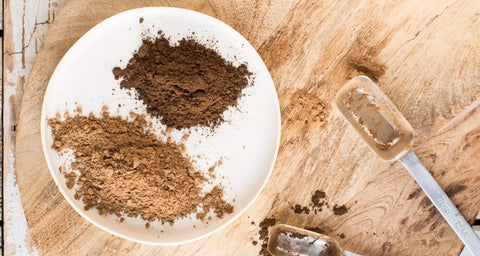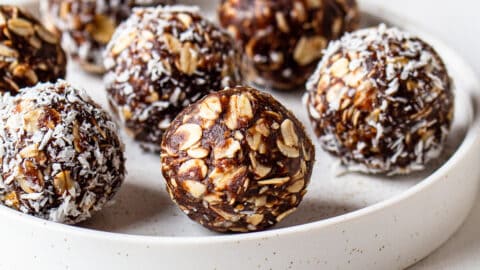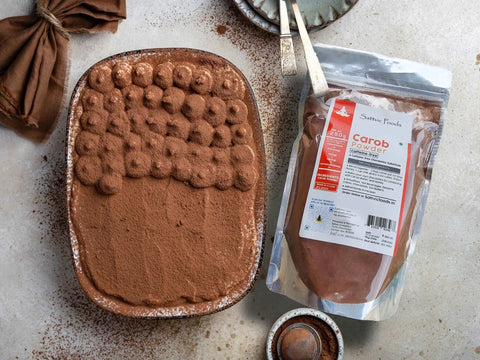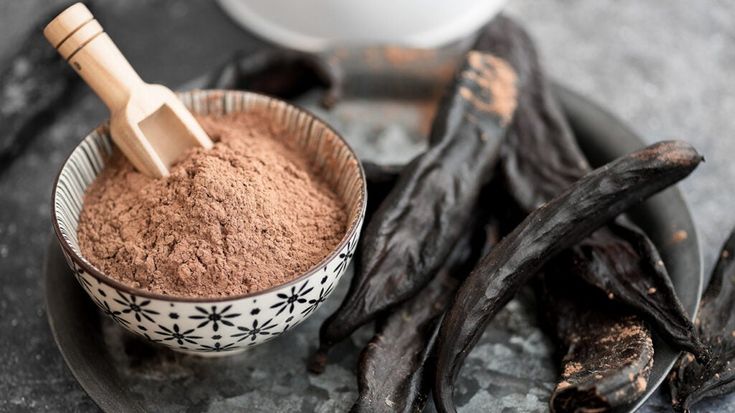Carob powder? Cocoa Powder? Carrot powder? What does Carob even mean?
Carob powder which is very similar in appearance to cocoa powder is a gem of the culinary world and has been gaining traction as a versatile and nutritious alternative to cocoa powder. Derived from the pods of the carob tree (Ceratonia siliqua), this ingredient offers a myriad of health benefits and culinary possibilities. In this comprehensive guide, we'll delve into the fascinating world of carob powder, exploring its origins, nutritional composition, health benefits, culinary uses, and more.
Carob Powder: Origin, Types, and Nutritional Profile
The carob tree, native to the Mediterranean region, has a rich history dating back thousands of years. Cultivated for its pods, which contain the sweet pulp and seeds used to produce carob powder, this tree has played a significant role in various cultures and cuisines. Today, carob trees are cultivated in regions with a Mediterranean climate, including Spain, Portugal, Greece, and parts of North Africa.

There are two primary types of carob powder based on the roasting process:
- Light Roast Carob Powder: In this variation, the carob pods undergo a gentle roasting process before grinding. This results in a milder flavour profile compared to the medium roast, with subtle caramel undertones.
- Medium Roast Carob Powder: The carob pods are subjected to a slightly longer roasting period, intensifying their flavour and giving the powder a richer, deeper taste akin to cocoa. This type often exhibits a darker hue compared to the light roast variant.
While people often use them interchangeably, carob and cacao powder are actually quite different. Carob powder is mildly sweet with a hint of nutty and caramel flavours, while cacao powder is bitter. Carob has almost no fat, which is great for those watching their fat intake. Cacao, on the other hand, is full of caffeine and theobromine, which can give you a bit of a kick. But it also contains tyramine, an amino acid that can trigger migraines. Carob doesn't have these, so it's a good choice if you want to avoid caffeine.
Apart from its distinctive flavour and versatility in recipes, carob powder boasts an impressive nutritional profile that contributes to overall health and well-being. Calcium and magnesium, both abundant in carob powder, play crucial roles in maintaining bone health and muscle function. Potassium supports heart health by regulating blood pressure and fluid balance in the body. Additionally, vitamins A and B contribute to overall vitality, supporting vision, skin health, energy metabolism, and nervous system function. Furthermore, carob powder is notably high in dietary fibre, making it an excellent choice for promoting digestive health and aiding in weight management. Fibre helps regulate bowel movements, prevents constipation, and promotes a feeling of fullness, which can assist in controlling appetite and managing weight.

Health Benefits of Consuming Carob Powder
The consumption of carob powder is associated with numerous health benefits.
- Digestive Health: The high fibre content of carob powder promotes regularity and supports a healthy digestive system. Incorporating fibre-rich foods like carob into your diet can help prevent constipation and maintain bowel regularity.
- Blood Sugar Regulation: Carob powder contains natural sugars and complex carbohydrates, which are absorbed more slowly by the body, leading to gradual increases in blood sugar levels. This makes it a suitable option for individuals with diabetes or those looking to manage their blood sugar levels. If you want to read more on how you can use simple tricks to reduce your blood sugar (Glycemic Index).
- Heart Health: Studies suggest that the antioxidants found in carob powder, such as polyphenols, may help reduce the risk of heart disease by lowering levels of LDL cholesterol and triglycerides in the blood. Including carob powder in a heart-healthy diet may contribute to overall cardiovascular health.
Substituting Carob Powder
For those looking to incorporate carob powder into their recipes, it's essential to understand how it can be substituted for other ingredients. Carob powder can often be used as a 1:1 replacement for cocoa powder in recipes, providing a similar chocolatey flavour without the caffeine or theobromine found in cocoa. Additionally, carob powder can be used as a natural sweetener in place of refined sugar, adding sweetness and depth of flavour to dishes without the need for excessive added sugars.
Ready to embark on a flavorful journey? Let's dive into a world of culinary creativity with these enticing recipes featuring the rich, distinctive taste of carob powder.
Carob Buckwheat Banana Bread: Mash ripe bananas until smooth and add cold-pressed or wet-milled coconut oil, and vanilla extract to the mashed bananas. Mix until well combined. In a separate bowl, whisk together buckwheat flour, carob powder, baking powder, baking soda, and a pinch of salt. Gradually add the dry ingredients to the wet ingredients, stirring until just combined and bake!
Carob Energy Bites: In a food processor, combine rolled oats, shredded coconut, chopped nuts, pitted dates, carob powder, and a pinch of salt. Pulse the mixture until it forms a sticky dough-like consistency. Using your hands, roll the mixture into bite-sized balls and place them on a parchment-lined baking sheet. Refrigerate the energy bites for at least 30 minutes before serving to firm up.

Carob Chia Pudding: In a mixing bowl, combine chia seeds, almond milk, carob powder, honey, and vanilla extract. Whisk the ingredients together until well combined. Cover the bowl and refrigerate the mixture for at least 2 hours, or overnight, to allow the chia seeds to thicken and absorb the liquid. Serve the carob chia pudding chilled, either as a nutritious breakfast option or a satisfying dessert.
Carob Smoothie Bowl: Blend frozen bananas, almond milk, a spoonful of carob powder, and your favourite fruits like berries or mango until smooth. Pour the mixture into a bowl and top with granola, sliced fruits, coconut flakes, and a drizzle of honey for a delicious and nutritious breakfast or snack.
Carob Granola Bars: Mix rolled oats, chopped nuts, seeds, dried fruits, and a generous amount of carob powder in a bowl. Combine with coconut oil and honey until well coated, then press the mixture into a lined baking dish. Refrigerate until firm, then slice into bars for a wholesome and satisfying snack on the go.
Carob-Coated Almonds: Toast almonds in the oven until golden brown, then toss them in coconut oil and sprinkle with carob powder, cinnamon, and a pinch of sea salt or pink salt. Spread the coated almonds on a baking sheet and bake until crispy. Enjoy as a nutritious and flavorful snack or sprinkle over salads and yoghurt for added crunch.
Carob-Spiced Latte: Brew a cup of your favourite coffee or herbal tea (chamomile, green tea, hibiscus) then stir in a spoonful of carob powder, a dash of cinnamon, and a drizzle of honey or maple syrup. Top with frothed milk or a dollop of whipped coconut cream for a cozy and indulgent beverage without the caffeine jitters.
Click here to purchase Sattvic Foods carob powder and discover more recipe ideas.

Carob powder, with its delightful flavour, impressive nutritional composition, and versatile culinary applications, deserves a place of honour in any kitchen. Indeed, it's worth mentioning that Carob powder from Sattvic Foods is gradually gaining significant traction and is becoming increasingly popular among both consumers and industries. We are getting regular inquiries about carob powder and this is a testament to its rising popularity and demand. Whether you're baking sweet treats, whipping up nutritious snacks, or simply enjoying a comforting beverage, carob powder offers endless possibilities for culinary creativity and healthful indulgence. Embrace the magic of carob and elevate your cooking to new heights with this extraordinary ingredient.

